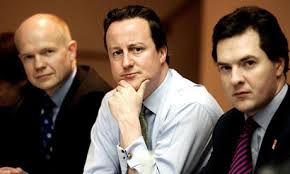I am posting a number of documents by Adair Turner relating to the concept of ‘helicopter money’. The term was coined by Milton Friedman and refers to the idea of simply dropping money into an economy to expand the monetary base without any commitment by a government or central bank to ‘pay’ for the money. Indeed, the point is to increase money supply, possibly permanently, in order to pay for government expenditure.
Printing money to cover a government’s bills is never going to be an easy policy to sell. But Turner has bravely put this option on the table because the place to which the major economies of the world are heading under current policy may actually be worse.
How so? Turner’s point is that the policy of central banks expanding their balance sheets and flooding financial markets with cash to force down interest rates to zero is merely fuelling asset bubbles – in real estate, in stocks, and even now in things like fine art. What the world needs is a return to somewhat higher interest rates to head off another speculative bubble and bust (selling some Apple shares yesterday at 18 times earnings and more than four times what I paid for them reminds me we may already be in bubble territory). The problem, of course, is that higher interest rates cannot come at the expense of another collapse in the demand in the real economy and hence a spiral of 1930s-style deflation. Logically, as Turner argues, the only option may therefore be to expand the monetary base, create a bit of inflation to allow a meaningful rate of interest, and simultaneously use the printed cash pay off some government debt and fund expenditures that maintain real economic growth.
Such a policy would (probably) put the fiscal boot on the other foot compared with the past six years. Almost all UK and US policy since 2008 has favoured those with assets – real estate, stocks and bonds — as asset values have been restored by the near-zero interest rate policy. If rates rise, those who hold assets under leverage will pay more debt service and asset prices will come under pressure. On the other hand, a positive real interest rate gives those with only a bit of cash (the young, the poor) some return on their money in the bank, while money creation can pay for lower taxes on work and investment in things like infrastructure. In other words, such a policy tilts the table away from those with assets and towards those without assets but with a willingness to work for a living. You begin to see quite how outrageous this proposal is…
The proposition is indeed shocking. However it is a measure of the times in which we live that you really should read what Turner is saying. He is not a red, and nor are the economists (like Milton Friedman and Irving Fisher) whom he cites in support. Turner is pretty much an Establishment figure…
The lightest iteration of what Turner is saying is an FT opinion piece from last week. I have not done this before, but I am reproducing it in the hope the FT won’t pursue me for breach of copyright. (Having only been paid £250 for my recent opinion piece for them, perhaps they will decide they owe me a bonus; one notes that deflation is already haunting the Pink’Un.)
…
November 10, 2014
Printing money to fund deficit is the fastest way to raise rates
By Adair Turner
No technical reasons exist for rejecting this, only the fear of breaking a taboo, writes Adair Turner
What is the right course for monetary policy? The International Monetary Fund seems to answer with forked tongue. Its latest World Economic Outlook urges that monetary policy should stay loose to stimulate growth. Yet its Global Financial Stability Review warns that loose monetary policy risks creating financial instability, which could crimp growth. In fact the best policy is to print money and raise interest rates. That sounds contradictory, but it is not.
The global economy is suffering the hangover from many decades of excessive private sector credit growth. In 1950 private credit in advanced economies was 50 per cent of gross domestic product; by 2007 it was 170 per cent.
After the 2008 crisis, households and companies began trying to pay back what they owed. This depressed consumption and investment, generating large fiscal deficits as tax revenues fell and social expenditure rose. It then seemed essential to balance public sector accounts, which has depressed growth further and made deleveraging harder.
Debt owed by the public and private sectors has actually increased as a proportion of GDP, from 170 per cent five years ago to 200 per cent today. Weak demand has led to below-target inflation in all major economies.
Economists agree that this is how we got into the current mess, but they disagree about how to get out of it. Some, such as Paul Krugman and Lawrence Summers, argue for more relaxed fiscal policies. Cutting taxes or increasing public expenditure is the most certain way to stimulate demand. In Milton Friedman’s words it is an injection directly “into the income stream”. But this route out of recession would increase public debt even further. It seems blocked.
Instead, most countries have opted to combine fiscal tightening with ultra-loose monetary policy, setting short-term interest rates close to zero and using quantitative easing to reduce long-term rates and boost asset prices.
There are no technical reasons to reject such measures, only the fear of breaking a taboo.
But there are dangers. Sustained low interest rates create incentives for highly leveraged financial engineering. They make it easier for uncompetitive companies to survive, which could stymie productivity growth. And they work by restarting growth in private credit – which is what led to our current predicament. The Bank for International Settlements therefore argues that monetary policy should be tightened as well as fiscal, but that would depress demand yet further.
We should indeed seek a swift return to higher interest rates, to remove the dangerous subsidy to high leverage. But paradoxically, the best way to do that, particularly in Japan and the eurozone, would be to deploy a variant of Friedman’s idea of dropping money from a helicopter. Government deficits should temporarily increase, and they should be financed with new money created by the central bank and added permanently to the money supply.
Money-financed deficits would increase demand without creating debts that have to be serviced. This would lift either real output or inflation and allow interest rates to return to normal more quickly. True, banks might amplify the stimulus by creating additional private credit, but they can be restrained with higher reserve requirements.
There are no technical reasons to reject this option, only the fear that once we break the taboo, money-financed deficits will be used on too large a scale.
Despite that fear, de facto monetisation is inevitable in some countries, even if policy makers deny it.
Japan’s official policy involves using sales tax increases to make government debts sustainable, while massive monetary stimulus spurs inflation and growth. In fact there is no believable scenario in which Japan will generate fiscal surpluses sufficient to pay back its debts, nor one in which the Bank of Japan will sell all its holdings of government debt back to the market.
All the same, the pretence undermines the effectiveness of the policy. Japan should either delay the next sales tax increase, or announce a temporary fiscal stimulus financed with new money. It should make clear that the debt the government owes the central bank will never need to be repaid, dispelling fears of a massive future fiscal tightening.
Orthodox theory sees helicopter money as risky. But current quantitative easing policies are at least as risky, and have produced adverse side effects. In the UK the Bank of England has bought £375bn of government bonds to try to stimulate the economy through swollen asset prices and rock-bottom interest rates. It could instead have created new money to finance a smaller one-off increase in the fiscal deficit. If it had done so, a return to normal interest rate disciplines would now be nearer.
More. Turner for grown-ups:
Turner’s original CASS business school speech on this subject (2013)
And the slides that go with the CASS speech. (Lots of them, but many worth having if you live in the UK and are about to have people knocking on your door in the run-up to the May national elections asking you to vote for them. ‘Come in,’ you can say. ‘Have a seat and let’s look at the slides together!’)
A bit of Q&A with Turner and Michael Woodford from the Institute For New Economic Thinking blog.
Finally, on Thursday 20 November, the UK parliament will hold a backbench debate on the topic of ‘money creation and society’. It will be the first time that the issue has been addressed in a full debate in the House since the 19th century. You can watch here on Parliament TV and discover just how ill-equipped our politicians are to deal with the aftermath of the global financial crisis.








